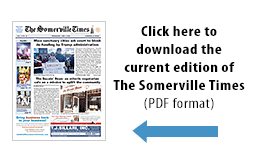 By Joseph A. Curtatone
By Joseph A. Curtatone
(The opinions and views expressed in the commentaries of The Somerville Times belong solely to the authors of those commentaries and do not reflect the views or opinions of The Somerville Times, its staff or publishers)
As organizers and community leaders work to put together an Olympics bid for metro Boston we need to cast our thoughts to 2124, not 2024. I support bringing the Olympics to Boston—if done right (which does not include a velodrome in Somerville). With thoughtful planning, I believe hosting the games could create an opportunity to deliver civic benefits to our region and to Somerville. We should not be planning to host a three-week party. Instead, we should be looking to dovetail Olympic preparations with community-building initiatives. We pride ourselves in being national and international thought leaders and a Boston bid should advance the Olympic ideal, using the Games as a transformative event to better the lives of the people in the city/region where the Games take place.
It should be noted up front that a Boston Olympics poses a stern test for regionalism. Area-wise, Boston is a small city. Certain events will have to take place outside the city limits. Many, likely even most, of the visitors for the event would need to stay outside the city. An Olympic Games naturally would spill over into municipalities like Somerville, Cambridge, Revere, Brookline, Newton, and Quincy. We have to work together to make the Olympics a successful event. Enormous strides have been made during the past decade to end our historical fractionalism, but this would mark a whole new level of shared regional stakes.
Infrastructure stands out as a leading regional issue. The MBTA connects many of our communities together and it would require a forklift upgrade in order for Boston to host a summer Olympics. Many of the necessary improvements have been identified. The Green Line extension has its funding identified and is underway. The Blue-Red connector and North-South connector linger as needed improvements. Modernized car stock, upgraded tracks, and improved signaling systems all would require attention. That doesn’t even touch on the Urban Ring Project, expanding existing lines into underserved communities, improving service to Logan Airport, or developing high-speed rail throughout New England. An Olympics would necessitate — and draw federal funding for — a radically different MBTA.
However, infrastructure involves more than rail lines. Roadways, bridgework, and traffic patterns need to be addressed. Pedestrian and cycling infrastructure needs to be added. For instance, collapsing the McGrath Highway overpass in Somerville would need to be fast-tracked, as would major alterations in how you get from Boston to Quincy. We have older sewer and water lines that need to be replaced. Our electric and communications grids cry out for modernization. Metro Boston relies upon too many remnants of 20th and 19th century infrastructure that need to be retired.
Then we come to housing. According to a recent Metropolitan Area Planning Council report, if we truly wish to address affordability and unmet housing demand, the Boston area needs more than 435,000 new housing units by 2040. In Somerville alone, the report calls for up to 9,000 housing units in that timeframe. Our regional housing shortage requires all hands on deck. And it can’t just be one- and two-bedroom condos for young professionals and empty nesters. We need to figure out housing for families as well, which requires more living space and reasonable prices. A Boston Olympics done right should embrace smart growth principles to net us thousands of new housing units—and housing units, not a hulking velodrome, would be a great fit for Somerville. Schools need to be part of the mix as well. Olympic infrastructure could be converted into public schools, new school facilities or needed additions to our public college system.
Also, sustainability should be weaved into all of the Olympic planning. The event should be used to lower our regional carbon footprint. If metro Boston doesn’t emerge from a massive undertaking like this both cleaner and greener, we did it wrong. The Olympics call for the youth of the world to assemble every four years, but to what end? Sport and community are the ideals of the Olympics. Yet the youth of the world faces a very real challenge in terms of climate change. The Olympics needs to leave each city where it lights its flame as a beacon for how modern societies can embrace a more sustainable future. Boston should offer itself up as the first of hopefully many to embrace that sort of transformation.
Finally, Boston’s Olympics should be a model of civic engagement. We should plan via community processes that tap into the high ideals and innovative thinking of our population, modeling how true citizen participation yields better results. In Somerville, our residents shaped the more than 500 goals for our 20-year comprehensive plan SomerVision. Surely the engaged citizens of greater Boston could unite in a public process to pool our best thinking on how to leverage the Olympics for needed community benefits. This should be an Olympics of the people, by the people, for the people.
The mere thought of hosting an Olympics seems daunting to many people, like a massive undertaking. Done right, it should be a massive undertaking, one with goals that extend far beyond the Games themselves. The municipalities that constitute Greater Boston share many of the same goals that we’re trying to tackle in piecemeal fashion. The Olympics presents an opportunity to leap forward on some of the most pressing issues such as transportation, infrastructure, and housing. A true Boston Olympics should be one where we go to the International Olympic Committee and say, “This is how you do it better.” We should be guided by John Winthrop and John F. Kennedy, using the Olympics to make Boston a true city upon a hill. That’s the Olympics I want metro Boston to pursue and I remain hopeful we can achieve it.















Reader Comments